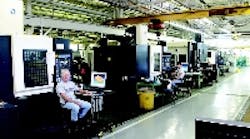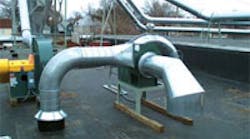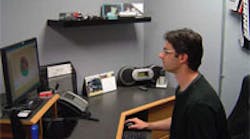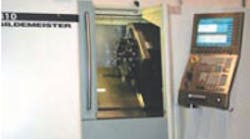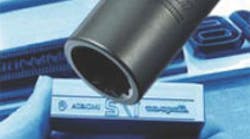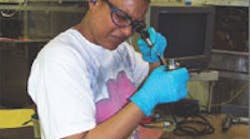PCs with PowerMill CAM software replace 2D prints at Delphi.
While most automotive companies focus on outsourcing as many manufacturing operations as possible, Delphi (www.delphi.com), a supplier of automotive electronics and systems technology, has successfully moved some of its moldmaking operations back in-house. CAM software and high-speed machining centers have proved critical for the company's Flint, Mich., 29 Mold Build Toolroom in meeting cost and delivery time objectives of that work.
At the onset of in-house mold building, the shop produced poorquality molds that were taking too long to build. It missed due dates and had dissatisfied customers. The remedy was an elimination of non-value-added practices, one of which was using 2D blueprints.
The shop now stations PCs loaded with PowerMill CAM software from Delcam (www.delcam.com) at its machining centers so operators can produce part programs at the machines without using 2D blueprints. "We could build molds with our previous software, but we could not do it competitively," says Scott Jedele, a math-based coordinator at Delphi.
Operating as an in-house build shop puts more pressure on the Delphi team than is placed on external suppliers. The group must match the lowest quote from outside the company, and it must complete delivery within 12 weeks. Despite those challenges, the volume of tooling the shop has completed has grown steadily since it was established in 2002. By the end of 2005, Delphi's 29 Mold Build Toolroom had, on average, 18 molds in process at any time.
Jeff Johns, a CNC machinist/CAM programmer at Delphi, says the combination-of operator experience, the shop's three Makino (www.makino.com) highspeed machining centers and the Delcam software consistently deliver excellent results. He says machinists can program exactly what is needed, which reduces the amount of aircutting time and the number of tool breakages.
Rob Bergeron, another Delphi CNC machinist/CAM programmer, says the shop has not had a gouge caused by software since installing the PowerMill CAM package. "This is becoming increasingly important because, in more applications, no weld marks are allowed on the mold tool surface, and one gouge can mean the mold insert would have to be remachined," Bergeron says.
Delcam's recently introduced PowerMill Modelling, a fully integrated data-repair module for the PowerMill CAM system, promises even more benefits for shops such as Delphi. The module lets users correct all the common faults with CAD data sent for machining, and it operates in the normal PowerMill window with similar left-toright workflow and style of icons.
The module contains the tools to identify and correct imported data problems such as duplicate or overlapping surfaces, incorrect surface trimming and gaps between surfaces. Similarly, shops can modify design features that may cause manufacturing problems, such as insufficient draft angles that could make it difficult to remove tooling from a part or small fillets that might extend cycle time by restricting material flow.
Because the module focuses on data repair rather than product design, there are fewer commands for users to learn. This shortens training time and allows casual users to find options more quickly. Also, being able to undertake model repair on the shop floor means that CAM operators can fix problems themselves and eliminate having to send data back to CAD-office staff.
